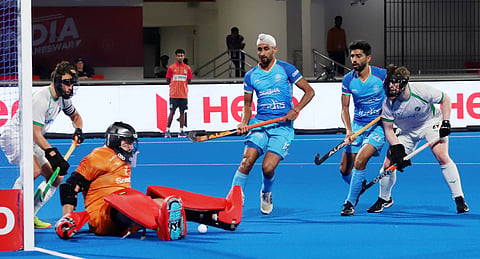

BHUBANESWAR: The beginning of a new Olympic cycle is sport's own way of resetting of the seasons. The winter is over, the winners have all gone home and spring is here. New narratives, fresh players and different systems. Longtermism is actively promoted by the people who run teams.
Over the last week or so, this has been one of the most visible themes at the Pro League in Bhubaneswar. Germany, at least on paper, are the world champions and the Olympic silver-medallists, but coach Andre Henning doesn't want to hear any of it. "That team is history," he says. "Most of our players cannot identify with (that feeling)."
India's Craig Fulton, who oversaw the bronze in Paris, has come here with an additional responsibility. Giving game-time to young players — he namechecked Arshdeep Singh — to give them an advantage when the junior World Cup rolls around later this year in Tamil Nadu.
Netherlands' Raoul Ehren, at some level, has the easiest as well as the hardest job in world hockey. Coaching the Dutch women's team. They are the the winningest women's team in the sport's history. They have won four of the last five Olympics, have an identical World Cup record and own each of the last four Euros. Put it this way — it's harder to get into their side than winning global gold. "Building a new team," he says. "We always want to improve." When you own everything the sport has to offer, the word 'improve' carries different connotations. Next to him in the mixed zone, a Dutch player rues they didn't keep a clean sheet in a 5-1 win. "It matters as we head into the future."
Welcome to the world of hockey in 2025 where Paris is now in the rearview mirror. The men's and women's team may physically be in Bhubaneswar but the focus is elsewhere. Henning, Fulton and a few of the others have their eyes on the Euros, the junior World Cup and a two-lettered city in the west coast of the US.
LA.
****
In most other team sports, competitions conducted by the governing body has a life of its own, a context attached to it. That's kind of missing at the Pro League, even if there's a World Cup spot for the winners. There's multiple reasons for it.
Here's Henning's take. "I really like this phase of the year," he says. "Giving young guys a chance, seeing how they influence the pitch, it's very exciting. Guys who were not leaders in the past but who are beginning to lead now. We wanted to take some guys off the treadmill because they played throughout the year. They have to play 40 games for their clubs, some of them have to play indoors. You just want to allow some of your players to breathe. Also, it's important to give some players a chance to play this level at an early age."
While the Pro League isn't important, there are other avenues to qualify for the senior World Cup. Germany, for example, can get through the Euros route. India know they will be there if they can win the upcoming Asia Cup. Both Fulton and Henning have, hence, decided to use high-quality opposition as a means to blood promising youngsters ahead of age-group World Cup. "We allow these guys to improve, allow these guys to make mistakes... it's all part of the growing up process," Henning says.
"That (considering the proximity of the junior World Cup) is why we brought Arshdeep," the South African coach says. "That's why the other two goalkeepers were with us and we played Gurjot (Singh) in China (in the Asian Champions Trophy). And that's why we have (Araijeet) Hundal. Do you see the bigger picture?"
The bigger picture Fulton refers to holds some weight because doing well at the junior World Cup can actually be a good indicator of transferring talent to the senior level. From an Indian perspective, the likes of Harmanpreet Singh and Mandeep Singh were part of the victorious 2016 campaign in Lucknow. They now form the spine of the senior side.
A more recent example is the German setup. In 2023, they won the junior World Cup; four of those players featured against India a few days ago, with one of them scoring (Florian Sperling). "We have a very inexperienced team here," Henning says. "This is the team for our future, for the next four-eight years. Everyone in the team is committed to at least LA. I was positively surprised about how mature the guys played."
But Henning wants to keep giving them chances for only consistent game-time will ensure their continued development. "This is a new team," he says. "We are the world champions only on paper. It's our job, my job, to take this team to that level (again). They are the Under-21 world champions so I knew there was quality but the world-class quality... you have to keep playing at this level to ensure they get there."
****
At the Olympics, the men's Spanish outfit had one of its best results in recent times as it finished fourth, just outside the podium places. But coach Max Caldas is one of the best when it comes to giving opportunities to young players.
For the Indian leg of the Pro League trip, he has with him as many as four players who delivered the age-group Euros last year. "This level is very high, so of course (it helps)," says Font, one of those four Spanish players. "We will look forward to the Under-21 World Cup because these sort of experiences will always help there."